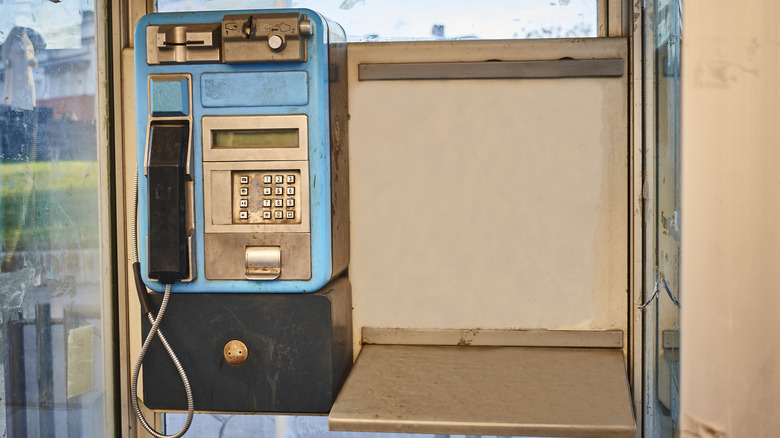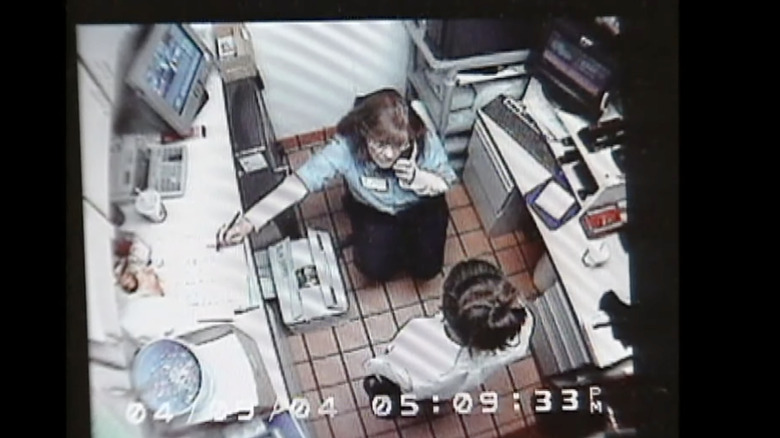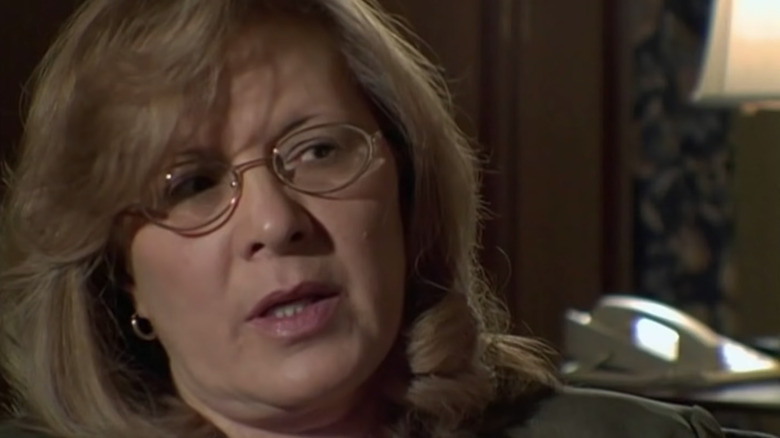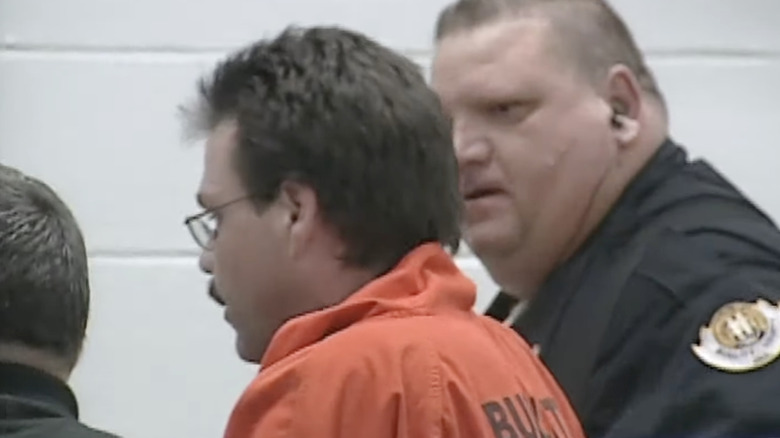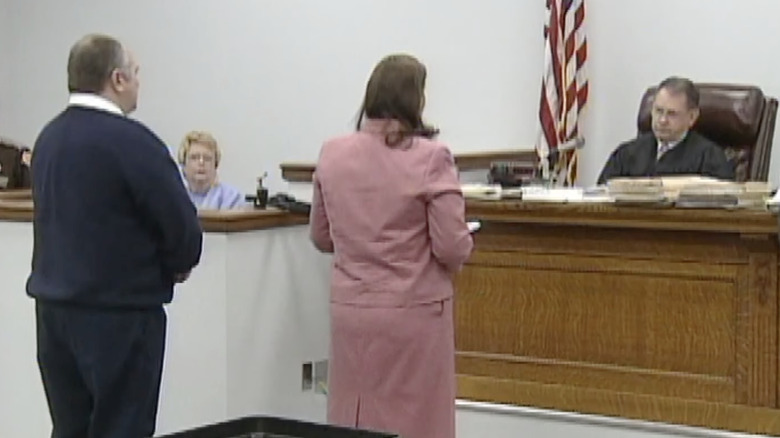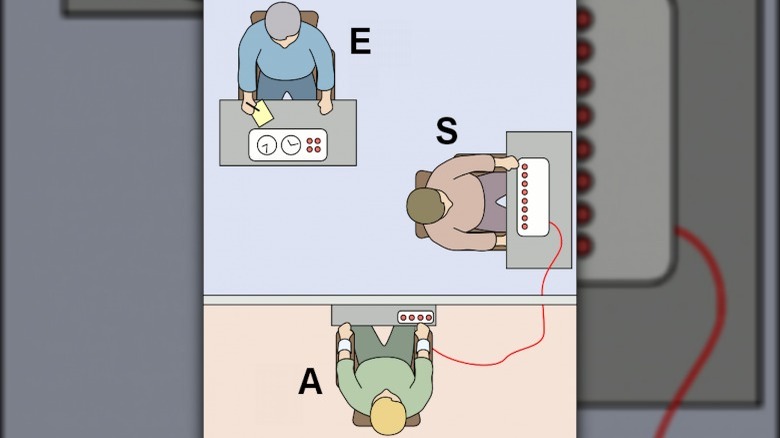The Strip Search Phone Call Scam Explained
Most people in the United States have been warned about scam phone calls and some people already consider it suspicious if someone they don't know on the other end of the line is asking for personal information. But what if the person on the other end of the line presents as an authority figure and wants something other than information?
In the late 1990s and early 2000s, people across the United States realized how easily someone can be subdued into following abusive instructions from a perceived authority figure that they can't see. With only a voice on the phone, someone was able to manipulate dozens of people across the United States into abusing others. In some instances, people rejected the abusive orders given to them but, by and large, the majority of people followed the instructions without question.
In 2012, this real-life story was dramatized in the film "Compliance" and in 2022, Netflix released a docuseries entitled "Don't Pick Up the Phone" following the investigation into what became known as the strip search phone call scam. This is the strip search phone call scam explained.
A twisted scam
Between 1992 and 2004, there were over 60 reports of phone scams targeting stores and restaurants in rural areas in the United States. According to OK Whatever, many of the calls were specifically made to fast-food restaurant chains, which often hired young people.
Generally, all the phone call scams followed a similar format. The person calling pretended to be a law enforcement officer, frequently either a police officer or a sheriff, and would call the store claiming that someone had reported a theft. The caller would then give instructions to the actual store manager who was present to perform strip searches, which included a body cavity search, on an accused person working in the store. The Louisville Courier Journal reports that although there were dozens of calls across over 30 states, law enforcement agencies believe the strip search phone call scam to be the work of one man because so many of the calls followed a similar pattern.
By 2004, the fast-food chain McDonald's had already been scammed in at least 17 different stores. Other popular restaurant chains like Burger King, Applebee's Neighborhood Grill & Bar, and Taco Bell had also fallen for the strip search phone call scam. But initially, when the store managers said that they were merely following orders from a police officer, everyone thought that was just an outlandish lie.
Starting in 1994
One of the first reported instances of the strip search phone call scam occurred in Saybrook Township, Ohio in 1994. According to the Ohio Court of Appeals, Christina Rhodes and Marsha Bratzel were both working their shifts at the McDonald's in Saybrook Township when they were separately called into their supervisor James Turcotte's office that August. Turcotte, on the phone with a person who claimed to be a sheriff's deputy, informed them that a customer's bag had been reportedly stolen.
Both Rhodes and Bratzel were given the phone and ordered by the "sheriff's deputy" to allow Turcotte to perform a strip search. While Bratzel only allowed a pat down over her clothes, Rhodes acquiesced and removed some of her clothes. Rhodes and Bratzel subsequently sued for molestation and severe emotional distress. And this was only the first lawsuit. By 2004, the McDonald's company was facing up to three other lawsuits related to the strip search phone call scam, according to Louisville Courier Journal.
And McDonald's wasn't the only one facing legal consequences. In 1997, Pizza Hut and one of its managers, Michael Tran, were sued by Mary Degruise for "false imprisonment, assault, and intentional infliction of emotional distress," per the United States District Court for the Northern District of Mississippi. Meanwhile, victims' accusations were frequently dismissed by both police and the restaurant companies, who believed that they were merely enacting their own scams.
If you or anyone you know has been a victim of sexual assault, help is available. Visit the Rape, Abuse & Incest National Network website or contact RAINN's National Helpline at 1-800-656-HOPE (4673).
Growing more abusive
As the years went on, the strip search phone call scams continued and became more and more abusive. The Louisville Courier Journal writes that in May 2002, an 18-year-old girl on her first day of work "was forced to strip, jog naked and assume a series of embarrassing poses." The Joplin Globe reports that in 2004, the caller threatened a 16-year-old manager with arrest if she didn't perform oral sex on a 21-year-old cook at a Sonic restaurant in Joplin, Missouri. The cook was also subsequently ordered by the caller to strip-search the young manager.
The caller also sometimes used claims of drugs to justify strip searches. And on at least one occasion, the caller expanded his pool of victims from just workers to customers as well. In June 2003, a 14-year-old girl was targeted at a Taco Bell in Juneau, Alaska after the manager received a call from someone claiming to be investigating drug abuse in the store. A 17-year-old girl who was a customer at a Taco Bell in Fountain Hills, Arizona was also strip-searched in 2004, ABC reports.
If you or anyone you know has been a victim of sexual assault, help is available. Visit the Rape, Abuse & Incest National Network website or contact RAINN's National Helpline at 1-800-656-HOPE (4673).
Restaurant companies were aware
It wasn't like restaurant companies had absolutely no idea what was going on. By 2003, there had been numerous reports of strip search phone call scams in restaurants and some companies had even sent out memos warning their employees of the hoax. But the memos were mainly sent to those who owned and operated the franchise, rather than to those who actually worked in the store and answered the phones.
Even when store managers did see the memo, it didn't seem to make much of an impact. According to the Louisville Courier Journal, one assistant manager read a memo about strip search phone calls approximately a month before performing a strip search on a waitress at an Applebee's in Davenport, Iowa for over an hour and a half. OK Whatever writes that the assistant manager reported being ordered to do so by a regional manager on the phone, and although he recalled seeing the memo after the incident, he claimed that at the time of the phone call, he'd simply "forgotten" about it.
ABC reports that McDonald's claimed that they trained their workers to be aware of the strip search phone call scam and their training manual included the line "no legitimate law enforcement agency would ever ask you to conduct such a search." But few workers interviewed recalled this part of the training.
A particularly severe case in Kentucky
On April 9, 2004, 18-year-old Louise Ogborn was working at McDonald's in Mount Washington, Kentucky when someone claiming to be "Officer Scott" called the store. "Officer Scott" claimed that a McDonald's worker was accused of stealing someone's purse and that he had the corporate office as well as another manager, Lisa Siddons, on the line with him. After providing a description of the suspect to 51-year-old assistant manager Donna Jean Summer, Ogborn was called into the back office, writes the Louisville Courier Journal.
Ogborn was given the choice to be searched at the store or arrested and searched in jail. Ogborn submitted to the search in the back room and Summers, following the instructions given by the caller, ordered Ogborn to remove all of her clothes and surrender her keys and phone. ABC reports that at the time, Summers continued to believe that the instructions were being given by a police officer.
Kim Dockery, another assistant manager, was present during this strip search at Ogborn's request and watched as Ogborn wept and stripped. But Summers didn't explain the situation to Dockery, per the caller's instructions, and Wave3 reports that Dockery was asked to leave after the caller heard her try to console Ogborn. Jason Bradley, a cook, was also brought in to watch Ogborn at one point, but Wave3 writes that Bradley refused to cooperate with the caller's instructions and left.
The case escalates
"Officer Scott" told Donna Jean Summers to take Louise Ogborn's clothes to her car, where he claimed the police would come to pick them up. Ogborn was held hostage by Summers and the caller for an hour until Summers told "Officer Scott" that she had to get back to work and couldn't continue monitoring Ogborn until the police were supposed to arrive. It was at this point that the caller proposed asking Summer's fiance, Walter Wes Nix Jr., to come to the McDonald's and watch Ogborn until the police arrived, reports the Louisville Courier Journal, despite the fact that he didn't work at McDonald's.
By the time 43-year-old Nix arrived, Ogborn had only an apron with which to cover herself. But ABC reports that when Summer left Nix alone with Ogborn and the caller, Ogborn was ordered to drop her apron and start performing various motions including bending over, dancing with her arms above her head, and jumping jacks. Nix was told by the caller that this would allow anything she'd hidden to "shake out."
If you or anyone you know has been a victim of sexual assault, help is available. Visit the Rape, Abuse & Incest National Network website or contact RAINN's National Helpline at 1-800-656-HOPE (4673).
The victim is rescued
Louise Ogborn was held hostage and forced to endure abuse by the caller and Walter Wes Nix Jr. for two and a half hours. The entire time, Ogborn was forced to call Nix "Sir" and if she failed to do so or failed to comply with any of the caller's instructions, Nix would strike her buttocks repeatedly. ABC reports that the surveillance video showed that in one instance, Nix struck Ogborn for 10 straight minutes, leaving Ogborn with red welts from the beating. And the Louisville Courier Journal writes that whenever Donna Jean Summers entered the office, Nix simply forced Ogborn to cover herself with the apron until Summers left.
The abuse culminated with Ogborn being ordered to perform oral sex on Nix. Ogborn tried to reason with Nix, but she was again threatened with violence and was forced to perform oral sex. After the sexual assault, the caller told Nix that he could leave and Summers was once again told to find someone to watch Ogborn. Wave3 reports that Tom Simms, a 58-year-old maintenance worker at the McDonald's, happened to be having dessert in the restaurant at the time and was subsequently brought into the room by Summers to keep watch over Ogborn. Simms reportedly didn't want to go into the room with Ogborn, "But she was there, and you know, there was something wrong," Simms later recounted. Meanwhile, Summers insisted that the corporate office knew what was going on.
If you or anyone you know has been a victim of sexual assault, help is available. Visit the Rape, Abuse & Incest National Network website or contact RAINN's National Helpline at 1-800-656-HOPE (4673).
Realizing it's a scam
Like Walter Wes Nix Jr., Tom Simms was handed the phone and the caller gave him instructions similar to the ones he'd given to Nix. But Wave3 reports that when Simms was told to order Louise Ogborn to remove her apron, he refused. "I kept saying all the time I was in there: 'make sure you keep that apron wrapped around you.'"
ABC writes that Simms informed Donna Jean Summers that the caller was asking for Ogborn to remove her apron and Summers was reportedly stunned. It was only at this point that Summers finally realized that something wasn't right about the situation. She called Lisa Siddons, the manager who the caller claimed was also on the call at the time, and realized that Siddons had no knowledge of the phone call or the situation. Siddons had been at home, sleeping.
According to the Louisville Courier Journal, while Summers hysterically begged Ogborn for forgiveness, Ogborn trembled from the cold and the shock of the experience and asked if she still had to come to work the next day.
Searching for the caller
By the time Donna Jean Summers realized what was going on, the caller had already hung up the phone. But by punching "*69" in the phone, the call was traced to a supermarket pay phone in Panama City, Florida, ABC reports. After the Mount Washington Police Department got in touch with the Panama City Police Department, they discovered that they weren't the first police departments to reach out to the Panama City Police Department regarding strip search phone call scams.
The Louisville Courier Journal writes that the investigation into the strip search phone call scam seemed to move forward after the Mount Washington incident. Up until then, some restaurants didn't even report the incident to the police because they were afraid of bad publicity.
In his investigation, Detective Buddy Stump from Mount Washington teamed up with Detective Sergeant Vic Flaherty from West Bridgewater, Massachusetts, who was leading a task force that was investigating four strip search phone call scams that had occurred in February 2004. Flaherty helped Stump trace the calling card that had been used in the Mount Washington McDonald's call and using surveillance video from the Wal-Mart where it was purchased, they identified that the man in the video was wearing a Corrections Corp. of America jacket. The warden at the company's Bay Correctional Facility later named David R. Stewart as the man in the video, according to Tampa Bay Times.
Arresting David Stewart
David R. Stewart was arrested in Fountain, Florida on July 1, 2004. Tampa Bay Times reports that while executing the search warrant at Stewart's house, the police discovered other calling cards similar to the one used to call the Mount Washington McDonald's. One of the cards had even been used to call at least nine restaurants in 2004, one of which was a Burger King in Idaho Falls, Idaho that had reported a strip search phone call scam incident. Police paraphernalia was also found, including uniforms and guns, along with applications for police department jobs. ABC reports that Stewart also sometimes volunteered as a deputy in western Florida.
According to the Louisville Courier Journal, Stewart denied purchasing the cards but stated, "Amen it's over," when he was arrested. Stewart was charged with solicitation of sodomy and impersonating a police officer and was extradited to Kentucky to be brought to trial for the felony charges.
The trials of Nix and Summers
Upon leaving the restaurant, Walter Wes Nix Jr. repeatedly called his friend and said to him "I have done something terribly bad." After watching the surveillance video of what happened in the office while she wasn't there, Donna Jean Summers ended her engagement with Nix, who was charged with sexual assault, sexual misconduct, and unlawful imprisonment. Summers was fired for bringing a nonemployee into the office and was also charged with unlawful imprisonment, per Louisville Courier Journal.
The Cinemaholic writes that after David Stewart was arrested, Nix was offered a plea deal to serve only five years if he agreed to testify against Stewart. Nix agreed and he was sentenced in 2006. Summers was ultimately sentenced to one year of probation in 2006. Out of the other strip search phone scam incidents across the United States, seven other people were also convicted for following the caller's orders.
Stewart's trial
On October 24, 2006, the trial against David Stewart began. Wave3 reports that Stewart faced up to 15 years if he was convicted of "soliciting sodomy, soliciting sexual intercourse and impersonating a police officer." During the trial, Louise Ogborn testified how she was diagnosed with post-traumatic stress disorder and experienced severe anxiety and depression after the incident. "I can't trust anyone. I push people out of my life because I don't want them to know what happened," per Louisville Courier Journal.
After a week of testimony and nearly two hours of deliberations, the jury found Stewart not guilty in November 2006. NBC reports that this was likely due to the fact that much of the evidence against Stewart was circumstantial with no witnesses, especially since the exact calling card used to call the Mount Washington McDonald's was never recovered. Since Stewart's arrest, reports of strip search phone scam calls have ceased, but no one else has ever been arrested or charged for the strip search phone call scam.
If you or someone you know needs help with mental health, please contact the Crisis Text Line by texting HOME to 741741, call the National Alliance on Mental Illness helpline at 1-800-950-NAMI (6264), or visit the National Institute of Mental Health website.
Lawsuits against McDonald's
In 2007, Louise Ogborn filed a civil lawsuit against McDonald's for $200 million in damages, alleging that McDonald's was culpable for failing to adequately warn its workers about the strip search phone call scam. ABC reports that McDonald's acknowledged Ogborn's PTSD, but, in an attempt to avoid any responsibility, their forensic psychologist tried to perversely argue that Ogborn had "grown in some way" from the sexual assault.
But in October 2006, a jury found McDonald's culpable and awarded Ogborn $6.1 million in damages, including $5 million in punitive damages and $1.1 in compensatory damages. Although McDonald's appealed the verdict, Wave3 reports that in 2009, the Kentucky Court of Appeals upheld the jury's verdict. McDonald's subsequently petitioned the Kentucky Supreme Court to review the verdict, but in March 2010 they withdrew their petition and agreed to a $1.1 million settlement, per Courier & Press.
The Cinemaholic writes that in 2007, Donna Jean Summers also sued McDonald's for $50 million, and a jury found McDonald's liable for $1.1 million. However, in 2009, this amount was reduced to $400,000 during appeals.
How could this happen?
In reading about the strip search phone call scams, many people believe that they would never agree to strip search someone just because someone on the phone claiming to be a police officer told them to do so. But history offers us far too many examples of how easily people can follow the instructions of someone they perceive to be an authority figure.
In many ways, the strip search phone call scam was a real-life version of the Milgram experiments. During the Milgram experiment, people were told that they were part of a study on how punishment affects learning. But in fact, the study was focused on how willing they were to give painful electric shocks to people who answered questions incorrectly. According to the University of California, Berkeley, up to 65% of people were willing to continue administering painful electric shocks all the way to the maximum voltage just because they were told to do so by the experimenter.
According to Sacred Heart University, people don't "judge the morality of their behavior in the same way they would if not following orders." This is likely why the caller chose the persona of a police officer or work superior because they are the ones that society conditions people to submit themselves to. As per Sacred Heart University, "disobedience would be considered disruptive to polite social exchange — a transgression that would cause embarrassment."



